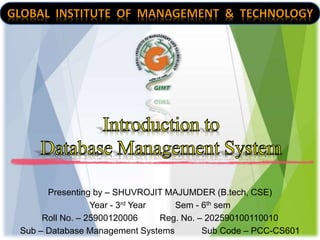
DBMS Presentation by SHUVROJIT MAJUMDER
- 1. Presenting by – SHUVROJIT MAJUMDER (B.tech, CSE) Year - 3rd Year Sem - 6th sem Roll No. – 25900120006 Reg. No. – 202590100110010 Sub – Database Management Systems Sub Code – PCC-CS601
- 2. Contents
- 3. What is Data ? According to the Oxford “Data is distinct pieces of information, usually formatted in a special way”. Data is measured, collected and reported, and analyzed, whereupon it is often visualized using graphs, images or other analysis tools. Raw data (“unprocessed data”) may be a collection of numbers or characters before it’s been “cleaned” and corrected by researchers. It must be corrected so that we can remove outliers, instrument or data entry errors Why Data is Important Data helps in make better decisions. Data helps in solve problems by finding the reason for underperformance. Data helps one to evaluate the performance. Data helps one improve processes. Data helps one understand consumers and the market.
- 4. A database management system (DBMS) refers to the technology for creating and managing databases. DBMS is a software tool to organize (create, retrieve, update, and manage) data in a database. The main aim of a DBMS is to supply a way to store up and retrieve database information that is both convenient and efficient. By data, we mean known facts that can be recorded and that have embedded meaning. Database systems are meant to handle an extensive collection of information. Management of data involves both defining structures for storage of information and providing mechanisms that can do the manipulation of those stored information. Moreover, the database system must ensure the safety of the information stored, despite system crashes or attempts at unauthorized access. What is DBMS ? Database Management System Database Systems
- 5. To develop software applications In less time. Data independence and efficient use of data. For uniform data administration. For data integrity and security. For concurrent access to data, and data recovery from crashes. To use user-friendly declarative query language. WHY TO USE DBMS ?
- 6. WHERE IS DBMS BEING USED ? Airlines : reservations, schedules, etc Telecom : calls made, customer details, network usage, etc Universities : registration, results, grades, etc Sales : products, purchases, customers, etc Banking : all transactions etc
- 7. Data independence : Application programs should be as free or independent as possible from details of data representation and storage. DBMS can supply an abstract view of the data for insulating application code from such facts. Efficient data access : DBMS utilizes a mixture of sophisticated concepts and techniques for storing and retrieving data competently. This feature becomes important in cases where the data is stored on external storage devices. Data integrity and security : If data is accessed through the DBMS, the DBMS can enforce integrity constraints on the data. Data administration : When several users share the data, integrating the administration of data can offer significant improvements. Experienced professionals understand the nature of the data being managed and can be responsible for organizing the data representation to reduce redundancy and make the data to retrieve efficiently. Advantages of DBMS
- 8. Components of DBMS Users : Users may be of any kind such as DB administrator, System developer, or database users. Database application : Database application may be Departmental, Personal, organization's and / or Internal. DBMS : Software that allows users to create and manipulate database access, Database : Collection of logical data as a single unit.
- 9. REFERENCES 1. https://www.geeksforgeeks.org/what-is-data/ 2. https://www.geeksforgeeks.org/introduction-of-dbms-database- management-system-set-1/ 3. Database Management System - Components, Types & Advantages (byjus.com) 4. https://www.academia.edu/67444779/Introduction_to_Database_Managem ent_System